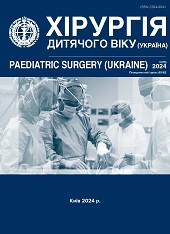Rapunzel syndrome in an adolescent child: clinical case
DOI:
https://doi.org/10.15574/PS.2024.4(85).143147Keywords:
children, bezoars, Rapunzel syndrome, surgical treatmentAbstract
Gastrointestinal bezoars in children are a rather rare pathology. Rapunzel syndrome is characterized by a large trichobezoar in the stomach with a tail that extends beyond the pylorus into the small intestine, causing mechanical obstruction of the small intestine. Some cases of bezoars remain undiagnosed for a long time, since complaints or objective changes are nonspecific.
Aim- to raise awareness of Rapunzel syndrome as a rare pathology of the digestive system in children.
Clinical case. The analysis of a retrospective clinical review of one case of surgical intervention for a large gastric bezoar. The patient's gender and age, composition and size of the bezoar, clinical, laboratory and instrumental changes, surgical tactics and scope of intervention were analyzed. The problem of diagnosing and treating rare diseases of the digestive tract remains relevant. The medical record of a 14-year-old teenager with Rapunzel syndrome was analyzed. Symptoms of the pathology were lack of appetite, abdominal pain, nausea, vomiting, weight loss, bad breath, and an objective examination of the abdomen revealed the formation of a dense consistency. After surgical treatment, the patient recovered without complications.
Conclusions. Rapunzel syndrome is a rare cause of digestive symptoms in children, such as abdominal pain, anorexia, or weight loss. Raising awareness of the risk factors for this condition is crucial for early diagnosis.
The research was carried out in accordance with the principles of the Declaration of Helsinki. Parents' informed consent was obtained for children's participation in the study.
The authors declare no conflict of interest.
References
Al-Osail EM, Zakary NY, Abdelhadi Y. (2018). Best management modality of trichobezoar: A case report. Int J Surg Case Rep. 53: 458-460. https://doi.org/10.1016/j.ijscr.2018.11.030; PMid:30567068 PMCid:PMC6275210
Elghazeery MA, Hassan AM. (2024). Gastrointestinal Bezoars in Paediatrics: Case Series and Literature Review. Afr J Paediatr Surg. 21(2): 101-106. https://doi.org/10.4103/ajps.ajps_104_22; PMid:38546247 PMCid:PMC11003570
Kumar M, Maletha M, Bhuddi S, Kumari R. (2020). Rapunzel Syndrome in a 3-Year-Old Boy: A Menace too Early to Present. J Indian Assoc Pediatr Surg. 25(2): 112-114. https://doi.org/10.4103/jiaps.JIAPS_1_19; PMid:32139992 PMCid:PMC7020672
Kwon HJ, Park J. (2023). Treatment of large gastric trichobezoar in children: Two case reports and literature review. Medicine (Baltimore). 102(16): e33589. https://doi.org/10.1097/MD.0000000000033589; PMid:37083802 PMCid:PMC10118359
Nettikadan A, Ravi MJ, Shivaprasad M. (2018). Recurrent Rapunzel syndrome - A rare tale of a hairy tail. Int J Surg Case Rep. 45: 83-86. https://doi.org/10.1016/j.ijscr.2018.03.017; PMid:29587201 PMCid:PMC6000761
Nour I, AbdAlatef M, Megahed A, Yahia S, Wahba Y, Shabaan AE. (2019). Rapunzel syndrome (gastric trichobezoar), a rare presentation with generalised oedema: case report and review of the literature. Paediatr Int Child Health. 39(1): 76-78. https://doi.org/10.1080/20469047.2017.1389809; PMid:29057712
Paschos KA, Chatzigeorgiadis A. (2019). Pathophysiological and clinical aspects of the diagnosis and treatment of bezoars. Ann Gastroenterol. 32(3): 224-232. https://doi.org/10.20524/aog.2019.0370
Sinha AK, Vaghela MM, Kumar B, Kumar P. (2017). Pediatric gastric trichobezoars with acute life threatening and undifferentiated elective bipolar clinical presentations Journal of Pediatric Surgery Case Reports. 16: 5-7. https://doi.org/10.1016/j.epsc.2016.10.009
Sivasubramanian BP, Ashokkumar M, Afzal M, SamalaVenkata V, Dhanasekaran UD, Palit SR et al. (2022,Oct 6). Rapunzel Syndrome in a Teenage Girl: A Case Report. Cureus. 14(10): e29975. https://doi.org/10.7759/cureus.29975
Wang L, Chen Y, Chen S, Gao Z, Qian Y, Chen Q. (2024). Gastrointestinal trichobezoars in the pediatric population: a retrospective study. BMC Pediatr. 24(1): 124. https://doi.org/10.1186/s12887-023-04489-x; PMid:38365624 PMCid:PMC10870568
Downloads
Published
Issue
Section
License
Copyright (c) 2024 Paediatric Surgery (Ukraine)

This work is licensed under a Creative Commons Attribution-NonCommercial 4.0 International License.
The policy of the Journal “PAEDIATRIC SURGERY. UKRAINE” is compatible with the vast majority of funders' of open access and self-archiving policies. The journal provides immediate open access route being convinced that everyone – not only scientists - can benefit from research results, and publishes articles exclusively under open access distribution, with a Creative Commons Attribution-Noncommercial 4.0 international license(СС BY-NC).
Authors transfer the copyright to the Journal “PAEDIATRIC SURGERY.UKRAINE” when the manuscript is accepted for publication. Authors declare that this manuscript has not been published nor is under simultaneous consideration for publication elsewhere. After publication, the articles become freely available on-line to the public.
Readers have the right to use, distribute, and reproduce articles in any medium, provided the articles and the journal are properly cited.
The use of published materials for commercial purposes is strongly prohibited.

